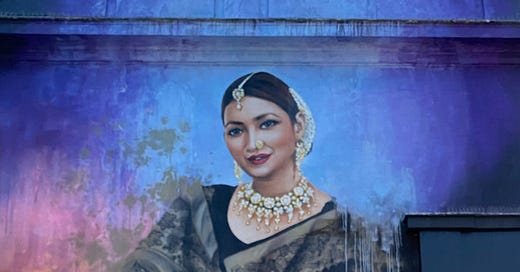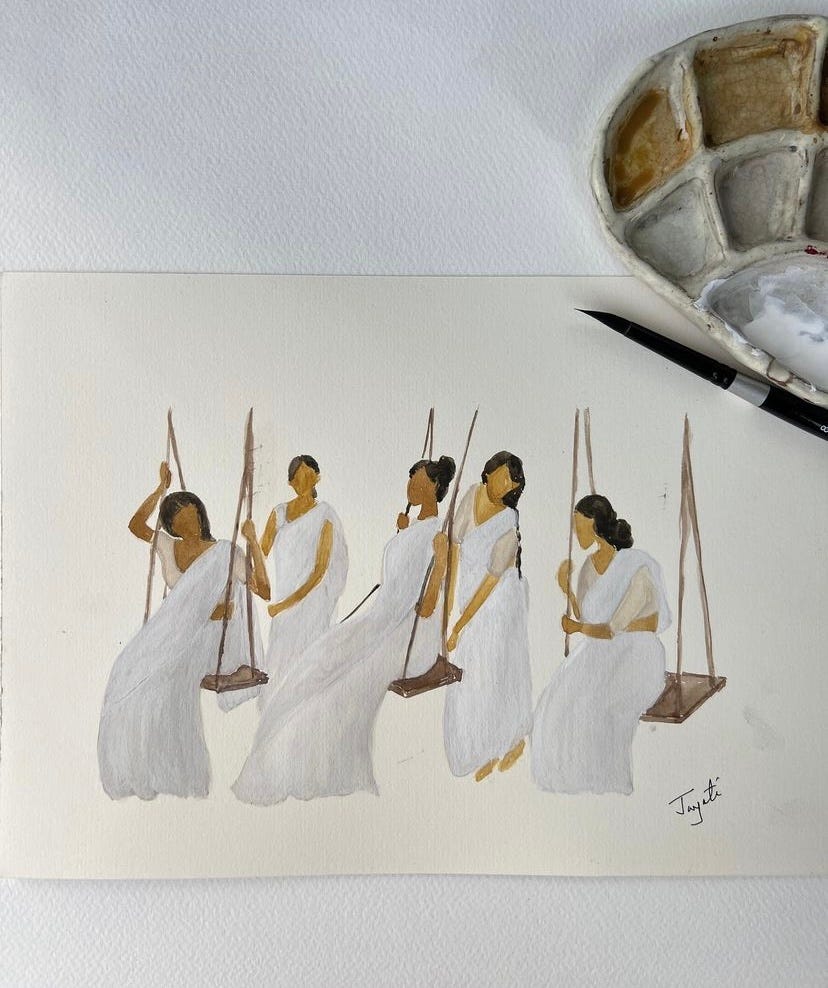Vol III: All My Girls and Me
Welcome to the love club, a monthly newsletter about writing, lifestyle, art, and all the thoughts in between. Thank you very much for being here.
Hello everyone and welcome back to the love club! I hope this past month has been good to you and that you’re looking forward to Spring making her mark as much as I am.
For me, this past month has been exciting and fulfilling, as well as being a time of reflection. One of the things I have been thinking the most about these last few weeks is all the women, and more specifically, Bengali women, who colour my life. March holds both International Women’s Day and Bangladesh’s Independence Day - two days which feel more and more important to me as I get older. With each passing year, I find that I become more conscious of my identities as a woman and as Bengali, and I give more thought to what those titles really mean for me and my life. It’s not as though I chose to be a woman, or to be Bengali, but in recent years I feel like I make an active decision to proudly be those things everyday, rather than passively accepting those titles.
I’ve spent a lot of time with the Bengali women I love this month. I went dress shopping with my sister, cousins, and aunts on Green Street in London (where I took the above image) for an upcoming family wedding. For most of my teenage years, I never really went Asian dress shopping, opting to order online for convenience. I didn’t think I was missing out on anything. But going with family, being surrounded by stunning, elaborately crafted dresses, and gushing about how beautiful one another looks when trying them on, felt like a reclamation of an experience lost. I went home that day feeling incredibly lucky to come from a culture with such rich beauty, and a family with such appreciation for it.
At university, I was fortunate enough to make friends with a group of Bengali girls who quite literally have changed my life. They’re a constant source of inspiration for me, each one of them talented, intelligent, kind, funny. But they have also instilled a sense of safety and ease in me - they’ve taught me so much about my heritage and my faith - and consequently they’ve taught me so much about who I am. Spending time with them this month has been joyous and healing, especially after the difficult loss of my grandma in February.
I have also had the chance to talk to and interview a number of incredible Bengali women recently, from a range of professions. I talked to the founder of Thawra magazine, Asia Khatun (interview below) about disrupting the literary industry, I interviewed a number of Bengali, Muslim artists about their craft for an article I’m writing about Islam and art, and I spoke to Rahima Begum, the co-founder of non-profit organisation Restless Beings, about her incredible work in providing food packs for refugees worldwide this Ramadan.
A pitfall of Bengali culture is that women being loud and successful and powerful is still considered to be somewhat of a threat - to what exactly I’m not entirely sure. For the women I spoke to, culture, from food to dress to family life, is imperative to the work they do and the art they create. Our conversations opened my eyes to the ways that Bengali women have chosen to find strength in their roots, rather than running away from them. They found success because of their culture, not in spite of it. That’s pretty wonderful to me.
These last few years have been transformative for me in so many ways, but undoubtedly two of the biggest things that have helped me grow is the influx of Bengali women entering my life, and expressing my gratitude to the ones who were already there. I’ve never in my life felt more loved, cared for, and seen, than I do in this moment, and that is all due to my friends, my sisters, my aunts, my mum. Knowing that I am loved in so many kind hearts is everything to me, and I hope that all my girls reading this know that you will always have a home in mine.
(Above image by Jayati Bose)
This newsletter was created with the intention of being collaborative, so each month, I’ll be talking about life, writing, creativity, and more, with someone who inspires me.
This month I had the pleasure of speaking to Asia Khatun, the founder of digital magazine and online platform for and by minority creatives, Thawra. Read our conversation below:
When did your love for literature begin? Were there any particular stories or poems that shaped your passion?
My love for literature began when I was a child. I remember when my brothers and myself used to very eagerly partake in the summer reading challenge organised by the library. We used to borrow heaps of books and finish that challenge within the week. Then jump to adolescence: I really came to search for more diverse literature that reflected the way I was seeing the world, seeing the injustice and the colonialism and the white supremacy that was impacting the state of almost everything in society. I think one of the very first poetry pamphlets I ever purchased was Warsan Shire’s Teaching My Mother How To Give Birth; it was inspiring to say the least. I also remember purchasing a collection of Modern Arabic poetry, which must’ve been about 800 pages long but absolutely opened up my world when it came to Romantic poetry. It felt like a natural advancement from reading Keats and Blake at school.
Where did the idea for Thawra come from, and what was the process of launching it like?
The idea for something like Thawra ruminated with me for a while at the latter end of my degree and it was an idea that I kept brushing off because I thought I didn’t have the technical skills to pursue it. However, during lockdown I decided to do the research, teach myself the necessary skills and take the plunge so that ethnic minority creatives could finally have an accessible platform to showcase and champion their work. The process of launching it was very time-consuming — it was a one-woman job, and has been for the most part until this year.
How important was your own heritage/cultural background in the founding of Thawra?
I come from a Bengali Muslim, immigrant, working class background. These parts of me have shaped the way I walk through this world and I can relate to all the boxes of othering that people from different backgrounds are put into, particularly ethnic minorities. Thawra is a place for the marginalised and the dismissed, for the voices that are not given the same opportunities as their white counterparts. BAME representation is hugely underrepresented in the creative industries due to the countless barriers to entry that ethnic minorities have to surpass in order to reach any modicum of success. Growing up othered, discriminated against and all the rest of it has led me to become totally passionate about social equality, and I believe Thawra is a small cog that is working hard to fix the rest of the institutionally racist and socio-economically privileged machine.
Are there any Bengali writers that you would like to recommend to the love club?
I would definitely recommend the anthology ‘Modern Bengali Poetry: Desire for Fire’ translated by Arunava Sinha. It’s one of my favourite anthologies that I’ve read to date and features so many brilliant Bengali poets. From Rabindranath Tagore to Nazrul Islam, it is such a beautiful collation of work and makes me feel connected to my heritage in a much deeper way, as I cannot read or write Bangla and therefore am always searching for translations of notable work!
This month I don’t have an original poem to share with you, so instead I’m sharing a poem written by my incredibly talented sister, which sums up the joy of coming from a long line of Bengali women.
A few recommendations…
Articles:
Malala’s Oscar’s Diary, for British Vogue
Today the Red Carpet, Tomorrow the World: Amelia Dimoldenberg Flirts with Ambition, Kenzie Bryant for Vanity Fair
What Khadijah (RA) Taught Me About Active Sabr, Rabia for Amaliah
Julie Begum, Activism, and The Bengali Community in London, Asia Khatun for Thawra
Podcasts:
NearlyWeds - Hosted by fiancees and Made in Chelsea alum Jamie Laing and Sophie Habboo, NearlyWeds documents Jamie and Sophie’s engagement period and their wedding planning. It’s really funny, really joyful, and the romantic in me loves anything to do with weddings so that makes it a 10/10.
The Digital Sisterhood - I’ve only listened to a few episodes of this podcast so far, but it came to me HIGHLY recommended, and for good reason. The Digital Sisterhood shares stories from different Muslim women about their lives, experiences, and journeys with Islam. It’s very thought-provoking and honest; regardless of if you’re a Muslim or not, I think that everyone can learn something valuable about faith and the female experience from this podcast.
Drama Queens - It seems like the cast of every nineties/early noughties teen drama got together and unanimously decided to create rewatch podcasts for their respective shows - and I’m not complaining. Drama Queens is hosted by Bethany Joy Lenz, Sophia Bush, and Hilarie Burton Morgan, the three female leads of my all time favourite teen drama, One Tree Hill. Each week they discuss an episode of the show, sharing their thoughts on the storylines and acting, but also about the environment they worked in and behind the scenes details. They shed a much needed light on the toxicity of film/tv sets and how creators can abuse their powers over young actors. The podcast combines nostalgia with activism, and is equally entertaining as it is enlightening.
Creators:
Moya Mawhinney - Anyone who knows me well knows that I am a bit obsessed with Moya Mawhinney. Moya is an Irish-Indonesian lifestyle/fashion content creator, currently living in Paris. She makes the most beautiful, warm, exciting videos documenting everything from making dinner in her apartment to attending Paris fashion week shows. Every video of hers makes me feel energised and appreciative of how big the world is.
Meg Hughes - I’ve only been watching Meg for a couple of months, but when I need something cosy and comforting to watch, I always gravitate toward her channel. Meg films weekly vlogs, most of which document her home-dwelling, studying, and practicing simple self-care. She’s a self-confessed introvert and her vlogs are a nice escape from the reams of Instagram/TikTok influencers that are always travelling and living their best (wealthy) lives. Her videos remind me that a good life is often a soft one.
And that’s a wrap on Vol. III, I hope you enjoyed and will return for Vol. IV! Until next time,
Mohsina x
Be a part of the love club, everything will glow for you






